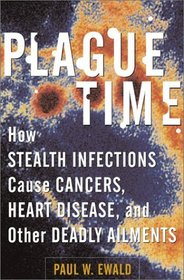Search -
Plague Time: How Stealth Infections Cause Cancer, Heart Disease, and Other Deadly Ailments
Plague Time How Stealth Infections Cause Cancer Heart Disease and Other Deadly Ailments
Author:
According to conventional wisdom, our genes and lifestyles are the most important causes of cancer, heart disease, and other killer ailments today. Conventional wisdom is wrong. In this bold, visionary book, biologist Paul W. Ewald argues that these serious illnesses are caused by a virtual plague of chronic infections. Acute infections give the... more »
Author:
According to conventional wisdom, our genes and lifestyles are the most important causes of cancer, heart disease, and other killer ailments today. Conventional wisdom is wrong. In this bold, visionary book, biologist Paul W. Ewald argues that these serious illnesses are caused by a virtual plague of chronic infections. Acute infections give the... more »
ISBN-13: 9780684869001
ISBN-10: 0684869004
Publication Date: 11/14/2000
Pages: 288
Rating: 2
ISBN-10: 0684869004
Publication Date: 11/14/2000
Pages: 288
Rating: 2
4 stars, based on 2 ratings
Genres:
- Health, Fitness & Dieting >> General
- Science & Math >> Biological Sciences >> Biology >> General
- Medicine >> Specialties >> Pathology >> General
- Medicine >> Internal Medicine >> Infectious Disease >> Communicable Diseases
- Engineering & Transportation >> Professional Science >> Biological Sciences >> Biology >> General
- Medical Books >> Medicine >> Internal Medicine >> Infectious Disease
- Medical Books >> Medicine >> Internal Medicine >> Pathology




